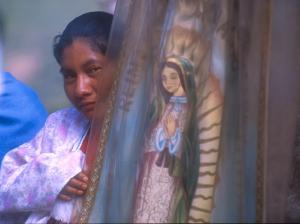Issue Date: May 14, 2004
Only 28 percent of people polled in 17 Latin American countries said they were “satisfied with democracy.” All of the statistics of the region reflect increasing inequality. The connections between economic well-being and democracy are well established. In the relationship between the two lies Latin America’s future. Throughout the 1970s and ’80s and into the last decade, Latin America stood at center stage for church and solidarity groups in the United States and figured prominently in U.S. foreign policy. Yet as the region’s civil wars and dictatorships came to an end and crises arose elsewhere on the planet, interest in Latin America waned. The perception grew that the newly democratic, market-oriented Latin America had been “fixed.” Trouble was, it simply wasn’t true. Nearly half the region’s population today remains in poverty and many of the rest see little chance for improving their standard of living, which is spurring emigration, especially to the United States. More than half the people in the region say they would accept an authoritarian government if it could solve their countries’ economic problems. That bodes ill for nascent democracies. And the deep inequalities that led to the devastating civil wars of recent decades are growing worse. The picture isn’t totally bleak. Many community, grass-roots and church groups are rising to the challenges facing their countries; indigenous peoples are making their voices heard (and occasionally overthrowing presidents); and the growth of cross-border solidarity is challenging the worst ravages of globalization. In this series, journalists Paul Jeffrey and Barbara Fraser explore these trends and the people behind them, uncovering both persistent, long-term problems and emerging changes. They interviewed more than 100 people -- including theologians, sociologists, economists, educators, women, children, church workers, indigenous leaders, politicians, bishops, experts on international policy, and grass-roots activists -- in 16 countries. They looked particularly for new voices, people who offered fresh perspectives on the forces shaping life throughout Latin America today. What follows is a view of Latin America and where it is headed through primarily Latin American eyes. -- The editors
National Catholic Reporter, May 14, 2004 |
